This post was updated April 29 at 11:27 p.m.
United Khmer Students’ 27th annual culture night merged dance, music and theater for a night of remembrance and Khmer resilience.
UKS has been fostering community and education on Cambodian heritage at UCLA since 1992. In the 27th annual culture night event at Schoenberg Hall on Saturday, titled “Reflection,” UKS’ mission was to bring attention to the Cambodian genocide. The show wove sequences of folk and classical Khmer dances with contemporary choreography within the narrative of an original play. The executive team for the organization includes co-directors Vince Khauv and Marissa Pe, assistant director Emily Ea and producer Tiffani Pe. Khauv said this year’s show was the pinnacle of a year’s worth of work.
“We want to inspire conversations about one’s own family histories and traditions and talk through what our share of history has in store for us and how we’re changed, how we’re shaped by that history,” Khauv said.
Khauv, a third-year history student, said this year’s event was especially important because it marks the 50th anniversary of the beginning of the Cambodian genocide perpetrated by the Khmer Rouge from 1975 to 1979. Khauv, who also served as the script writer of “Reflection,” said he drew from his father’s experience within Cambodia at the time. Khauv said he, along with many other members of UKS, is of Teochew Khmer heritage, a dialect group of ethnically Chinese individuals who migrated to Cambodia over the span of generations.
“Given that you don’t normally see Khmer representation in today’s media, we feel that it’s important to share our culture, share our experiences as a people that have came to this country fleeing war and genocide to express our ethnic and national identities within the framework of being Khmer American,” Khauv said.
[Related: Bike-powered Coastalong 2025 brings live music, sustainability to Drake Stadium]
The play comprises a dual narrative following the characters of Samnang (Kara Tous), a modern-day Khmer American high school student, and her father Heng (Nathan Seanarith Ros), who is traumatized by the Cambodian genocide. When Samnang is assigned a history project prompting her to investigate her family’s immigration experience, she is compelled to ask her father more about his life in Cambodia. Though Heng is weary of sharing with Samnang at first, he eventually does, and Heng’s story commences on stage.
“I really liked the relationship between the father and the daughter,” Melissa Hua, a second-year environmental science student, said. “Being Southeast Asian, or people of marginalized groups, it can be often really hard to have your voice heard, your perspective or your culture. And it also is such an amazing opportunity for people who are not a part of that culture to get a view into that, and so I always feel very inspired going to these events.”
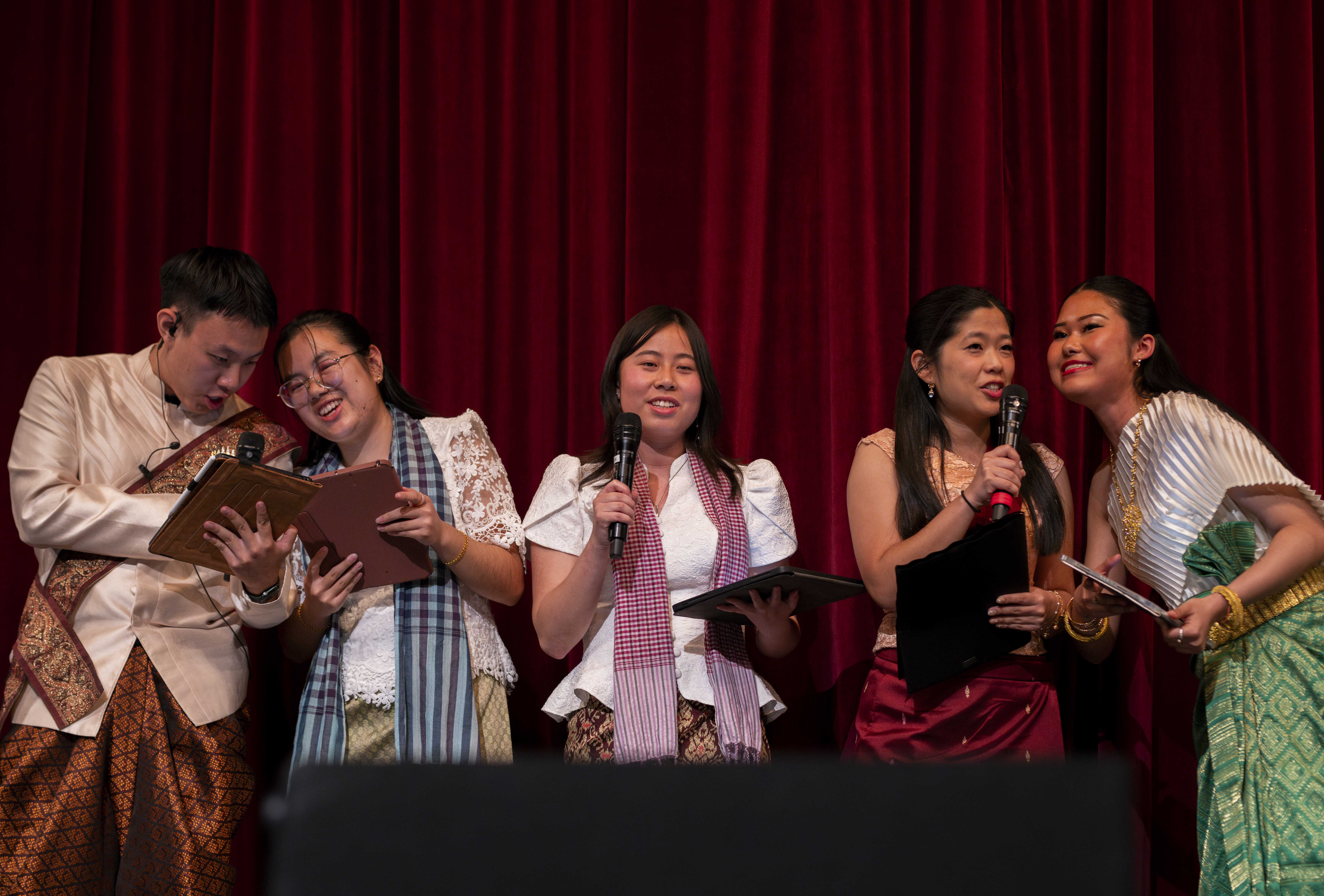
The three acts of the play each included a dance sequence. In Act I, dancers took to the stage to perform robam yike homrong, a folk Khmer dance. Act II, however, incorporated a modern dance following the final scene, in which Tam (Kelly Luong), Heng’s confidante and friend, is executed by the Khmer Rouge. Heng’s grief is expressed through a dance performed to Kendrick Lamar’s “United In Grief.”
“Every year is unique in its own sense,” Marissa Pe, a second-year sociology student and co-director, said. “This year, our modern dance is different in the sense that it has a darker tone to suit the darker and more serious environment of our show.”
Many audience members attended “Reflection” in support of friends and family members. Breanna Montoya, a first-year neuroscience student, said seeing her friend engage with her culture was a rewarding experience. Romred Tandoc, who attended “Reflection” in support of his girlfriend who was in the production, said he appreciated seeing Khmer dance and culture represented on stage.
[Related: ‘Climate Notes’ event plans to showcase connections of music, science]
Reflecting on the audience experience, Tiffani Pe, a second-year political science and public affairs student, said the executive board of UKS aimed to give back to the local Khmer community in a meaningful way by sourcing from local Khmer businesses and providing the show’s attendees with the opportunity to watch elements of Khmer culture displayed on stage. For example, she said the club sourced clothing, costumes and jewelry from a Long Beach business known as Khmer Bridal. She remarked on the significance of these garments and the ways in which the UKS were able to connect with them on a personal level.
“Our costumes for our dances are very colorful, very vibrant, very true to what perhaps past ancestors or family members might have worn if they were to also engage in such traditional dances,” Tiffani Pe said. “Everyone who’s in our traditional dance has been so excited to actually have the chance to wear one of these cultural garments, especially because they’ve never had the interaction, never even have been able to touch or see or have the chance to experience it.”
In addition to sourcing these costume garments and other materials from local Khmer communities, the executive team of UKS also platformed a Cambodian rock band, Sastra Moon. For the pre-show of “Reflection,” Sastra Moon performed three songs with the lead singer, Rane Prak, singing entirely in Khmer. During their set, Prak invited the audience to dance to the music. Some audience members obliged, mounting the stage to dance along.
“It’s amazing how we can mobilize an entire community to do something that tells us that we’re all gathered together to do something great that represents who we are,” Khauv said. “We can demonstrate to the rest of the world that we are Cambodian. We are Khmer.”
Overall, Khauv said “Reflection” represented the act of tracing ancestral history through artistic expression. Tiffani Pe said the production included around 60 members, and it was sometimes difficult to manage such a large team. Marissa Pe added that the camaraderie of the organization has been rewarding during rehearsals. For Khauv, the production is an especially personal one, being written from his father’s experiences. He said he believed this element was imperative to the event’s success.
“Seeing how large this production has grown … is a testament to being genuine, being able to communicate your idea effectively to the rest of your peers,” Khauv said. “Your passion becomes their passion.”
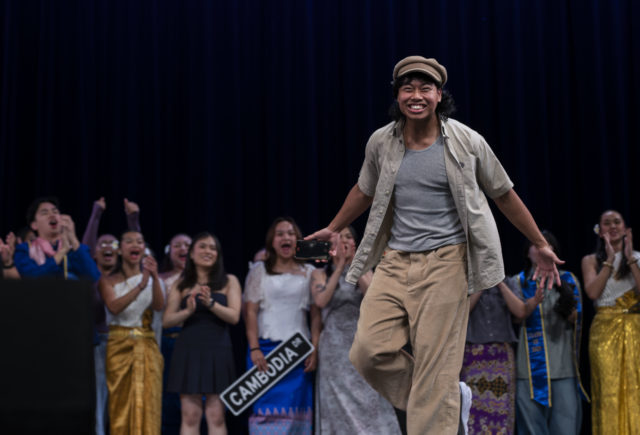

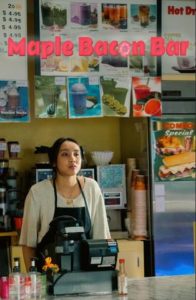
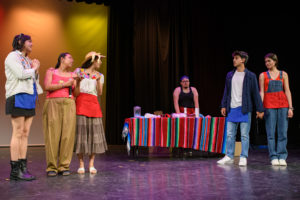
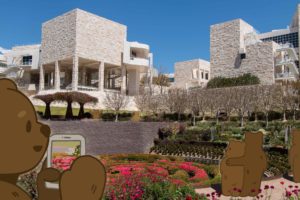
Comments are closed.